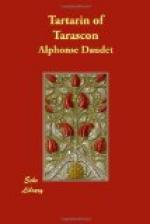In front of the house of the baobab there were two large handcarts. From time to time the gate was opened and one could see men walking busily about in the garden. They carried out trunks, cases and carpet-bags which they piled onto the carts. On the arrival of each new package the crowd stirred and a description of the article was shouted out. “That’s his tent! There’s the preserved foods! The medicine chest! The arms chest!” While the hat shooters gave a running commentary.
Suddenly, at about ten o’clock, there was a great movement in the crowd. The garden gate swung back violently on its hinges.... “It’s him!.... Its him!” they cried.
It was indeed him. When he appeared on the threshold, two cries of amazement rose from the crowd:—“He’s a Teur!.... He’s wearing sun-glasses!".... Tartarin, it is true, had believed that as he was going to Algeria he should adopt Algerian costume. Large baggy pantaloons of white cloth, a small tight jacket with metal buttons, a red sash wound round his stomach and on his head a gigantic “Chechia” (a red floppy bonnet) with an immensely long blue tassel dangling from its crown. Added to this, he carried two rifles, one on each shoulder, a hunting knife stuck into the sash round his middle, a cartridge-bag slung on one side and a revolver in a leather holster on the other. That was it. Ah!... forgive me... I forgot the sun-glasses, a huge pair of blue sun-glasses which were just the very thing to correct any suggestion of extravagance in his turnout.
“Vive Tartarin!... Vive Tartarin!” Yelled the people. The great man smiled but did not wave, partly because of the rifles, which were giving him some trouble and partly because he had learned what little value one can place on popular favour. Perhaps even, in the depths of his soul, he cursed these terrible compatriots who were forcing him to leave, to quit his pretty little house with its green shutters and white walls, but if so he did not show it. Calm and proud, though a little pale, he marched down the pathway, inspected his handcarts and seeing that all was in order set off jauntily on the road to the station, without looking back even once at the house of the baobab.
On his arrival at the station he was greeted by the station-master, a former soldier, who shook him warmly by the hand several times. The Paris-Marseille express had not yet arrived, so Tartarin and his general staff went into the waiting-room. To keep back the following crowd the station-master closed the barriers.
For fifteen minutes Tartarin paced back and forward, surrounded by the hat shooters. He spoke to them of his coming expedition, promising to send them skins, and entering their orders in his note-book as if they were a list of groceries. As tranquil as was Socrates at the moment when he drank the hemlock, the bold Tartarin had a word for everyone. He spoke simply and affably, as if before departing he wished to leave behind a legacy of charm, happy memories and regrets. To hear their chief speak thus brought tears to the eyes of the hat shooters, and to some, such as the president Ladeveze and the chemist Bezuquet, even a twinge of remorse. Some of the station staff were dabbing their eyes in corners, while outside the crowd peered through the railings and shouted “Vive Tartarin!”




